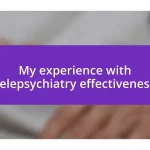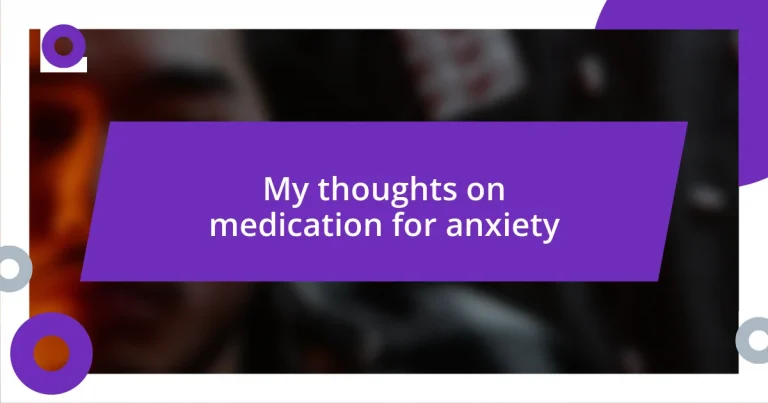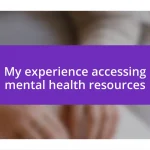Key takeaways:
- Anxiety affects both the body and mind, leading to significant emotional and physical symptoms that can disrupt personal relationships.
- Understanding different medication options, such as antidepressants and benzodiazepines, is crucial for informed decision-making, with a focus on balancing symptom relief and potential side effects.
- Combining medication with therapy enhances treatment effectiveness, allowing individuals to process emotions and experiences while facilitating open communication with healthcare providers.
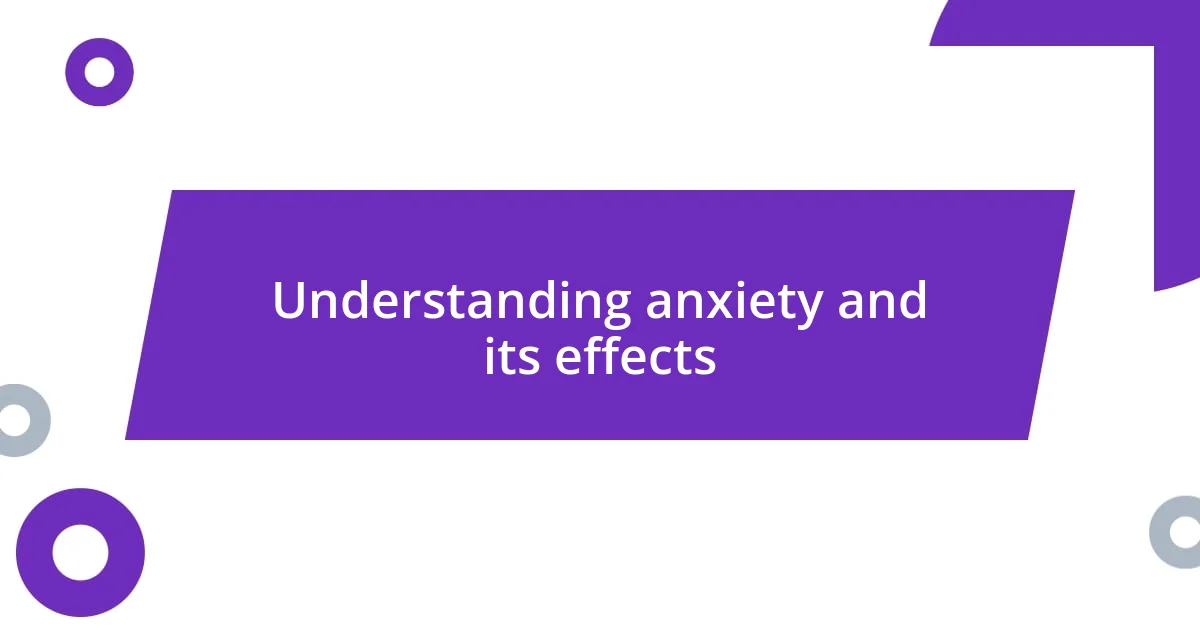
Understanding anxiety and its effects
Anxiety can manifest in various forms, often leading to feelings of dread and unease that extend beyond simple worry. I remember a time when I had to prepare for a big presentation; the knots in my stomach felt like they would never untangle. It made me wonder, why does our mind often betray us in such crucial moments?
The physical effects of anxiety can be just as striking as the emotional ones; it can lead to rapid heart rates, sweating, or even difficulty breathing. I’ve experienced those moments where a sudden wave of panic seemed to grip my chest, reminding me how our bodies can react violently to internal chaos. Isn’t it fascinating how our brain and body communicate in ways we might not always understand?
Moreover, anxiety can affect relationships, making it hard to connect with others. In my experience, there were times when I’d isolate myself, not wanting friends to witness my struggles, which created a cycle of loneliness. How do we begin to break that cycle and reach out for support when anxiety looms large?
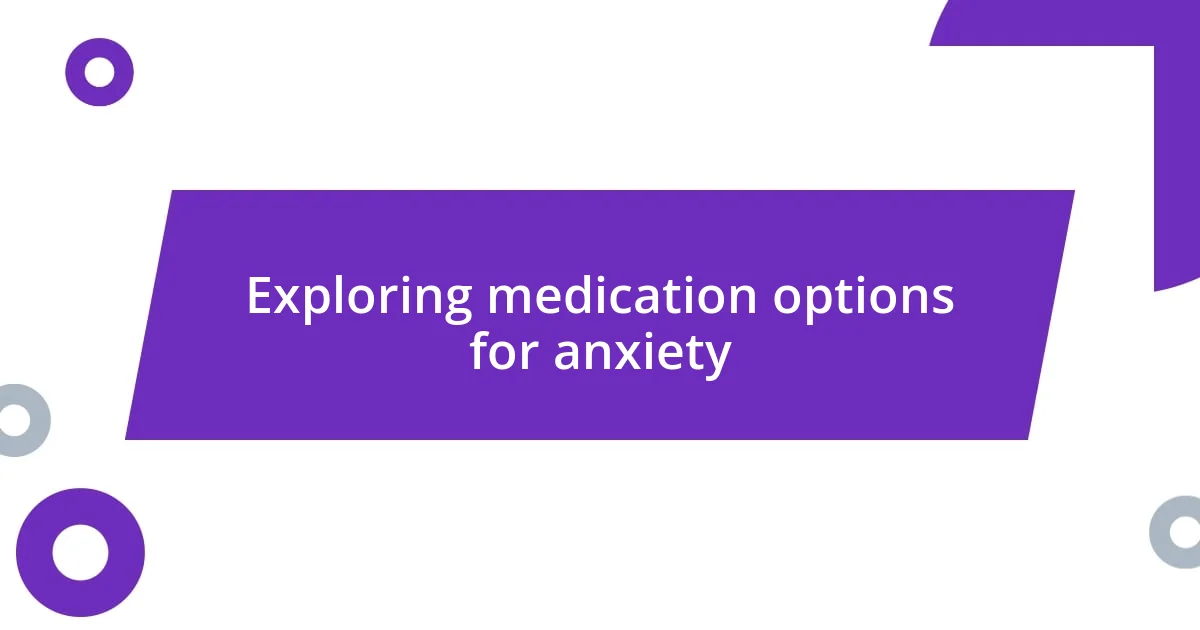
Exploring medication options for anxiety
Exploring medication options for anxiety can feel overwhelming. I remember feeling lost when my therapist first suggested medication; it was a mix of hope and fear. Through my experiences and discussions with others, I found that understanding the different types of medications can empower us to make informed choices.
There are primarily two categories of medications used for anxiety: antidepressants and benzodiazepines. Antidepressants, like SSRIs (Selective Serotonin Reuptake Inhibitors), often take time to show effects but can help manage anxiety long-term. On the other hand, benzodiazepines, which provide rapid relief, may pose risks of dependency if used for extended periods, giving me pause in my decision-making process.
When I finally chose to explore medication, I sought advice from both my doctor and support groups. I initially struggled with side effects, which led me to question whether I was on the right path. It was a journey of trial and adjustment, but each step taught me more about my needs and preferences, ultimately reshaping my relationship with anxiety.
| Medication Type | Key Features |
|---|---|
| Antidepressants (SSRIs) | Long-term relief, gradual effects |
| Benzodiazepines | Fast-acting but risk of dependency |
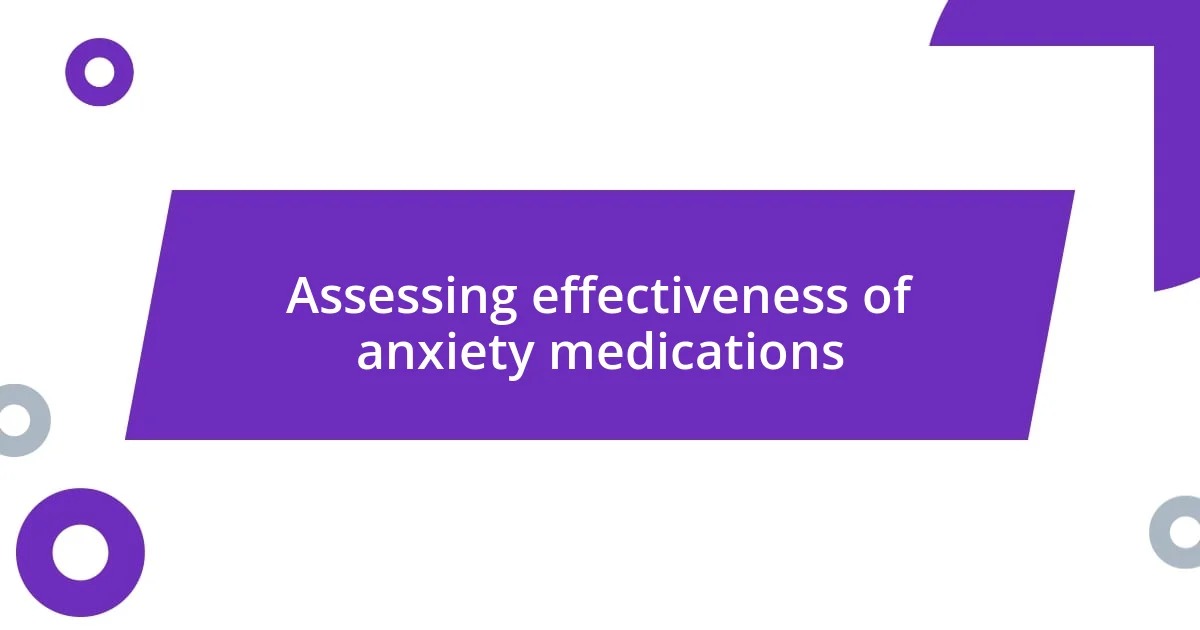
Assessing effectiveness of anxiety medications
Assessing the effectiveness of anxiety medications requires a careful balance of personal experience and clinical evidence. I remember tracking my progress with a journal, noting down my feelings and any side effects I encountered. It’s fascinating how much clarity you can gain from reflecting on your daily emotional state and how it intertwines with medication changes over time.
When evaluating these medications, consider the following points:
- Symptom Reduction: Noticeable improvement in anxiety symptoms—like fewer panic attacks or reduced tension—can signal effectiveness.
- Side Effects: Monitoring how side effects impact daily life can be just as important as symptom relief. I found that some medications affected my sleep patterns, which then influenced my overall mood.
- Duration: The time it takes for a medication to show results can vary. Some might feel an improvement in weeks, while others may take months.
- Quality of Life Changes: Assess how medication impacts personal goals, relationships, and daily activities. For me, a pivotal moment was when I could finally attend social events without feeling overwhelmed.
While there’s substantial research on the efficacy of these treatments, reflecting on my own journey helped me appreciate the nuanced experience each individual faces. I’ve learned that effectiveness isn’t just about numbers or clinical trials; it’s about feeling like you’re reclaiming control over your life.
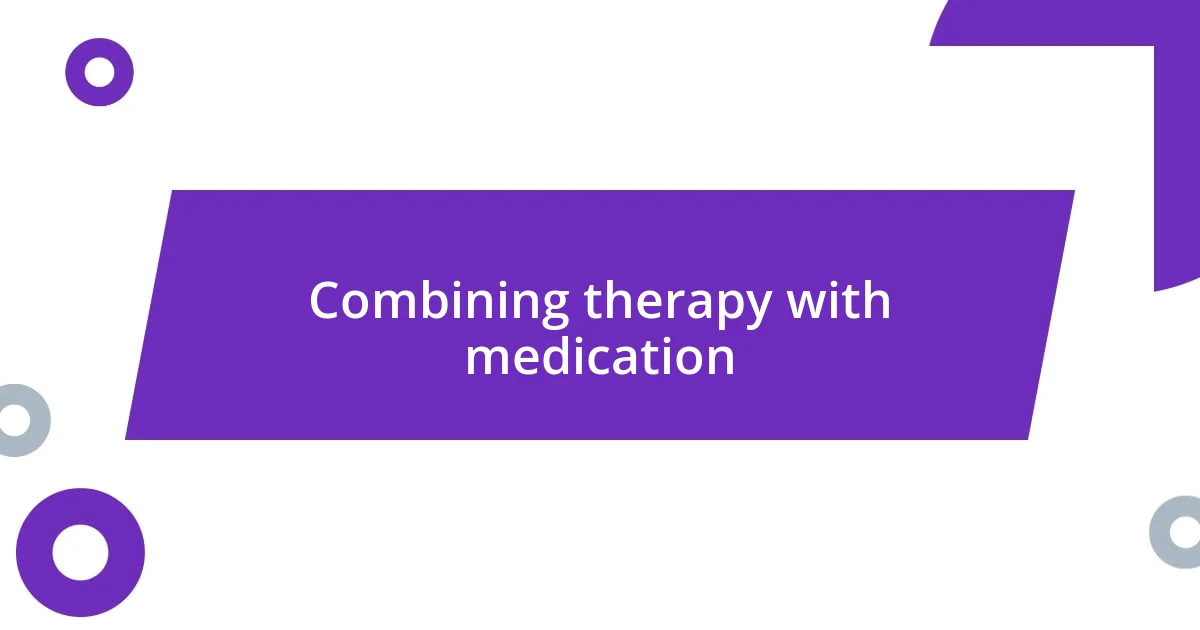
Combining therapy with medication
Combining therapy with medication can be a game-changer for managing anxiety. I remember my first therapy session after starting medication—it felt like having a safety net. The medications calmed my racing thoughts, allowing me to dive deeper into my feelings during therapy, which made the sessions more productive. Have you ever noticed how clarity in your mind can lead to breakthroughs in understanding yourself?
While medication offers relief, therapy tackles the root causes of anxiety. In my experience, working through my past traumas with my therapist created a space for healing that medication alone couldn’t provide. I often wondered how these two approaches could complement each other, and I believe that together they formed a holistic treatment plan. It’s like having the tools to build a bridge back to a life I love rather than just patching the cracks.
That said, it’s crucial to maintain open communication with both your therapist and doctor. I found it incredibly valuable to share my therapy insights with my prescribing doctor. They helped me adjust my medication based on my growth in therapy, making me feel supported in my journey. Have you ever felt that synergy where everything just clicks? It makes the process a bit less daunting and more reassuring as we work toward establishing balance in our lives.
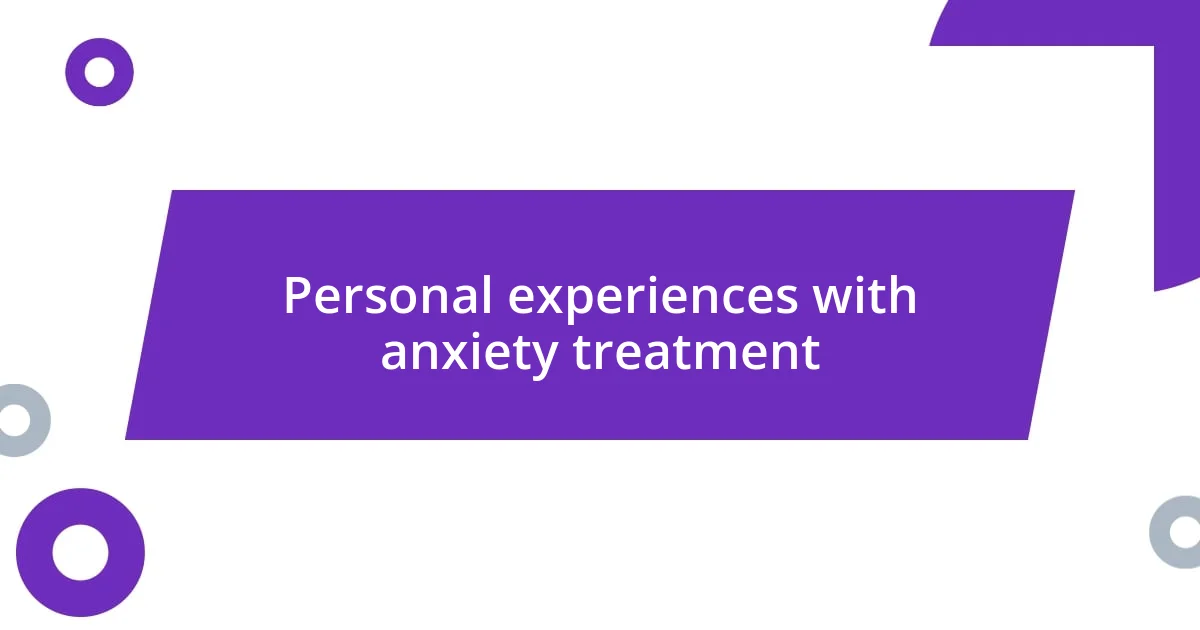
Personal experiences with anxiety treatment
Experiencing different anxiety treatments was like a rollercoaster for me. At one point, I was prescribed a medication that initially seemed like a miracle. I remember the moment I realized I could sit through a movie without feeling the urge to flee—what a relief! However, after a few weeks, that relief turned into a haze, and I felt like I was going through life in a fog. Did you ever feel like you’re not quite yourself because of medication? It was a disheartening realization that brought me back to the drawing board.
Eventually, speaking to my doctor about that fog was liberating. Sharing my experiences helped them tweak my prescription, and I found a balance that didn’t just mute my anxiety but allowed me to feel my emotions instead of numbing them. Connecting with my feelings, even the uncomfortable ones, opened up a pathway toward healing that I hadn’t anticipated. It’s a little daunting to think about how vulnerable you have to be, but I realized that sharing my experience led to a treatment that was so much more aligned with who I am as a person.
There were also moments when I felt overwhelmed and thought, “Will I ever find the right fit?” The uncertainty can be exhausting. Yet, looking back, I learned that patience is a big part of this journey. Each experience with medication was a stepping stone—a piece of the puzzle in understanding my anxiety and discovering what worked best for me. It just goes to show how important it is to stay engaged and honest throughout the process. Have you found yourself on a similar journey?
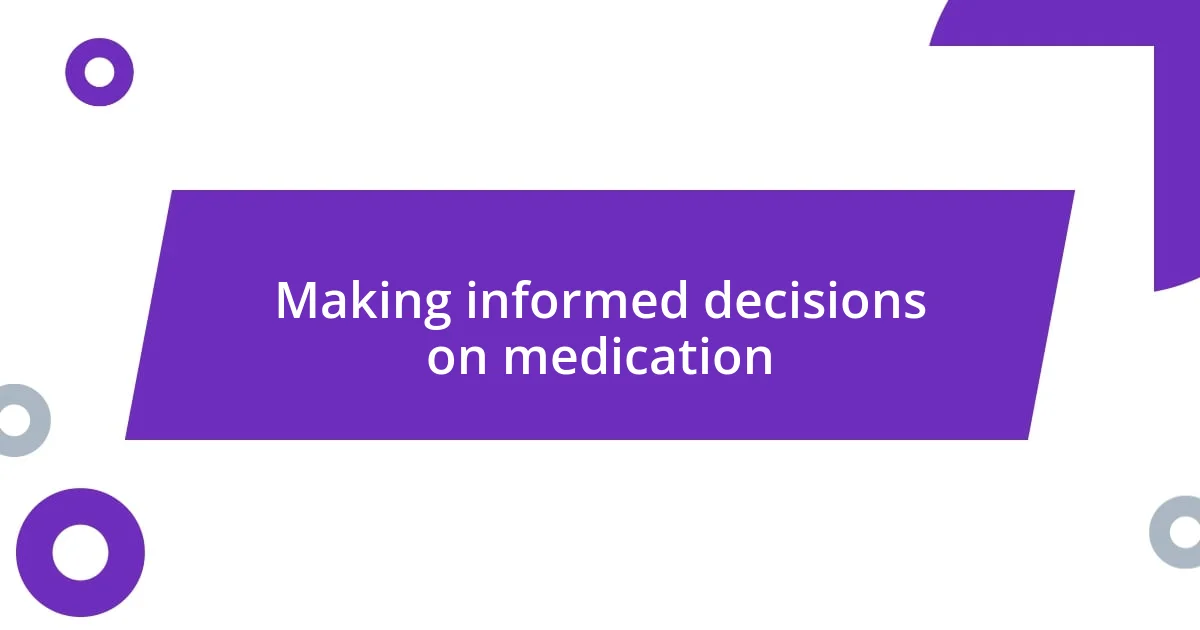
Making informed decisions on medication
Making informed decisions about medication for anxiety requires careful consideration of various factors. I remember the time I was overwhelmed by conflicting information about different medications. I spent countless hours researching side effects, interactions, and success rates, which ultimately led me to question what was best for my unique situation. It’s vital to seek clarity, don’t you think? Balancing what I read with advice from my healthcare provider helped me navigate these waters more effectively.
It’s also essential to consider how medications align with your lifestyle and overall goals. There was a point when I had to choose between a medication that had a reputation for efficacy but required strict adherence to a schedule and one that offered more flexibility. Sharing my daily routine with my doctor illuminated which choice made sense for me and my anxiety management strategy. Have you ever felt that crossroad where one decision could shape your journey? I know I have, and it was vital for me to be part of that dialog rather than feeling like a passive recipient of a prescription.
Ultimately, trusting your instincts plays a huge role in making informed decisions. During my experience, there were times I felt a medication wasn’t enhancing my life the way I hoped. I learned to listen to my body and voice those concerns to my provider. Trusting that instinct wasn’t always easy, but it helped me advocate for myself. Isn’t it empowering when you feel like you have a say in your treatment journey? Embracing that empowerment made the entire process feel more collaborative and reassuring.










